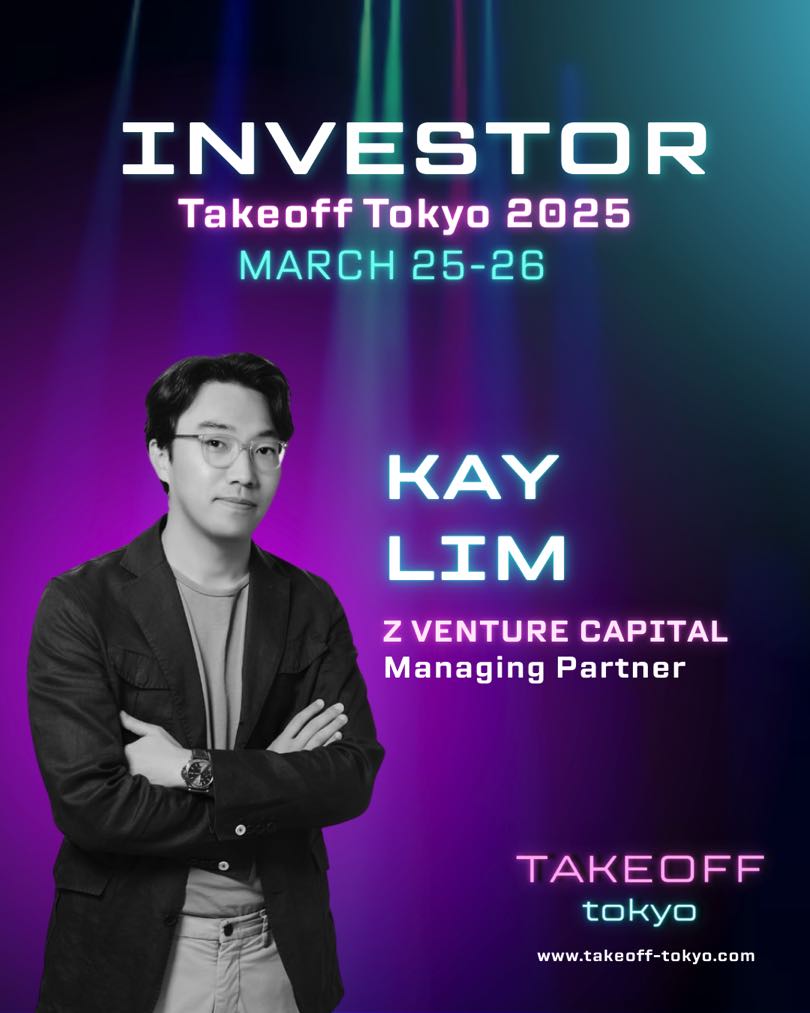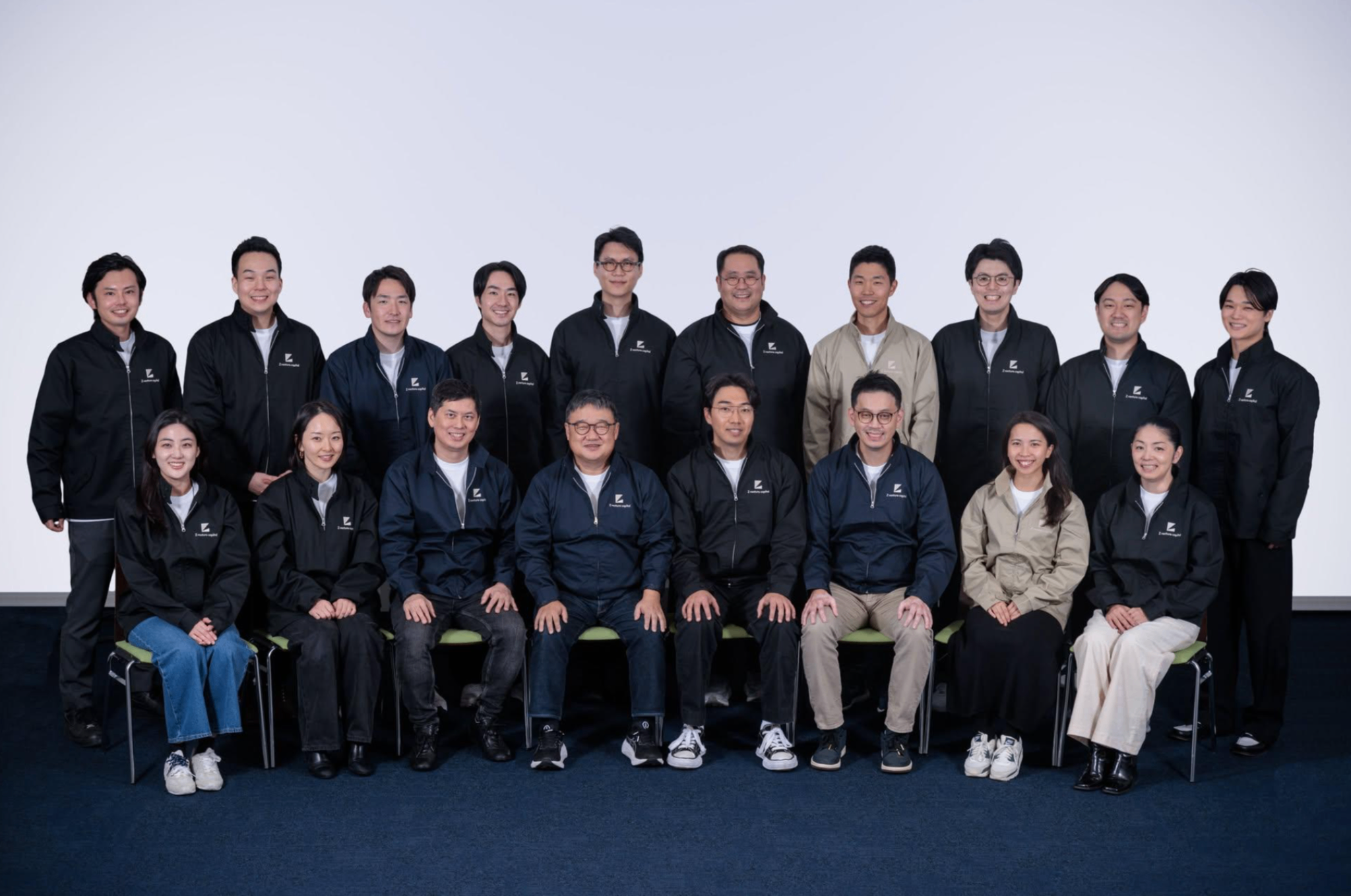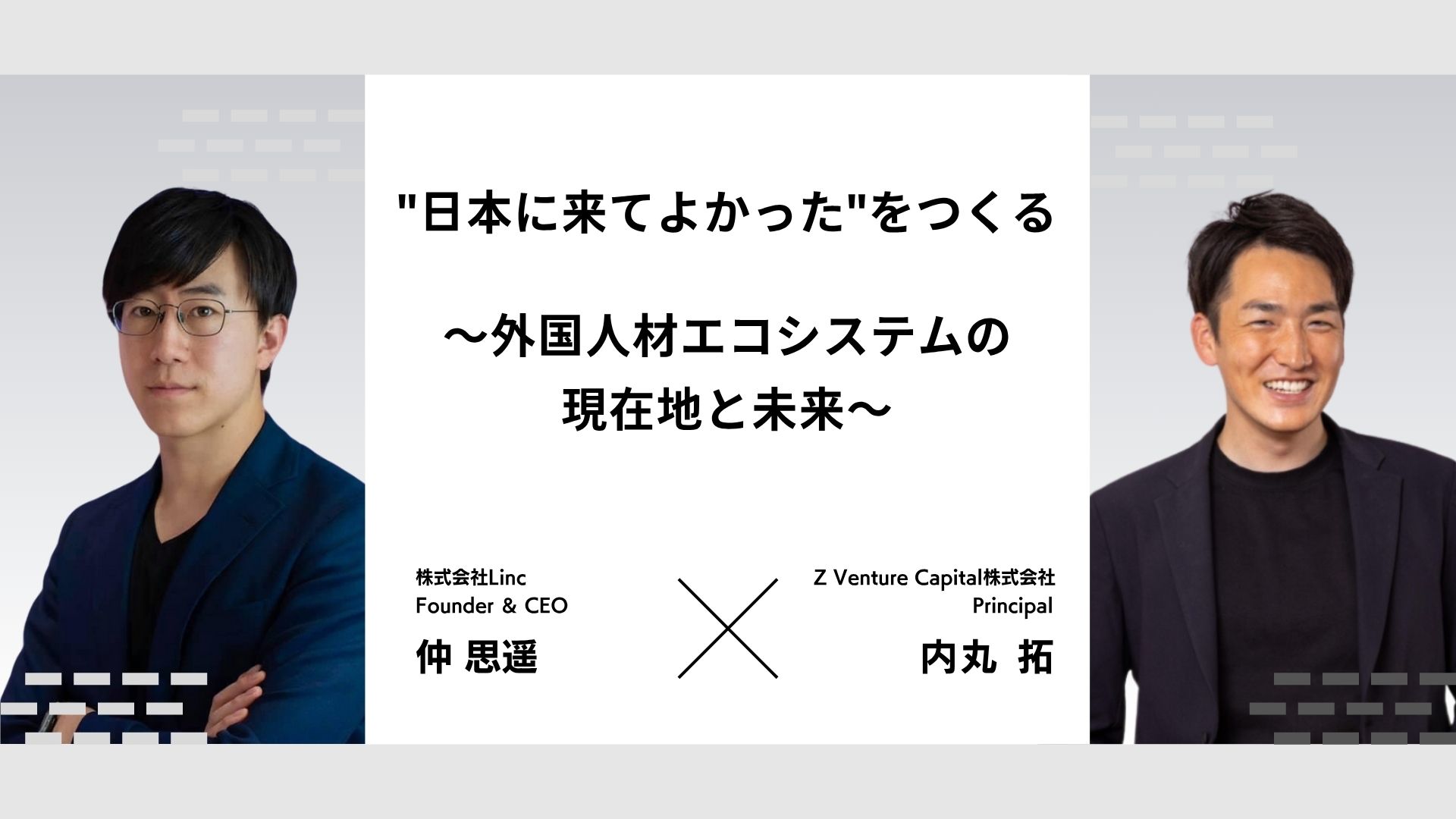
"Creating the Feeling of ‘I’m Glad I Came to Japan’ — Linc × ZVC on the Present and Future of the Foreign Talent Ecosystem"
by Shogo Takahashi
Z Venture Capital (ZVC) has continued to invest as the lead investor in Linc Inc. (Linc), which provides comprehensive support for foreign talent from job hunting through post-hiring training and development, following on from the previous round. In this discussion, we have a conversation between Linc's Founder & CEO, Shiyo Naka, and ZVC's Principal, Taku Uchimaru.
We want to make "I'm glad I came to Japan" a reality—what drives this commitment? We explore the current state of their challenge to connect regions and the world through "work" and bring sustainable options to Japan's future.
Participant Profiles
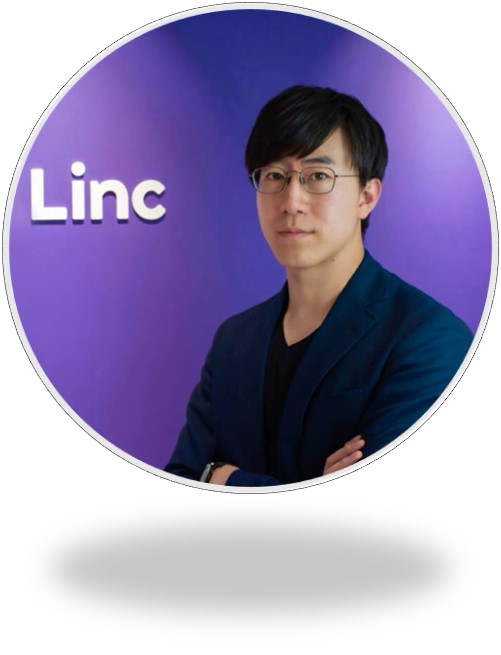
Linc Inc. CEO Shiyo Naka
Originally from China. Studied abroad in Japan after graduating from high school. After graduating from the Faculty of Law at Keio University, worked in the investment banking division of Nomura Securities, engaging in M&A and fundraising activities in the IT industry both domestically and internationally. As a foreigner herself, she founded Linc to create a society full of diversity and inclusiveness where foreign talent can thrive in Japan, where the declining birthrate is rapidly progressing and labor demand is increasing. Operates a platform that supports foreign talent's "work," "learn," and "live" in Japan.
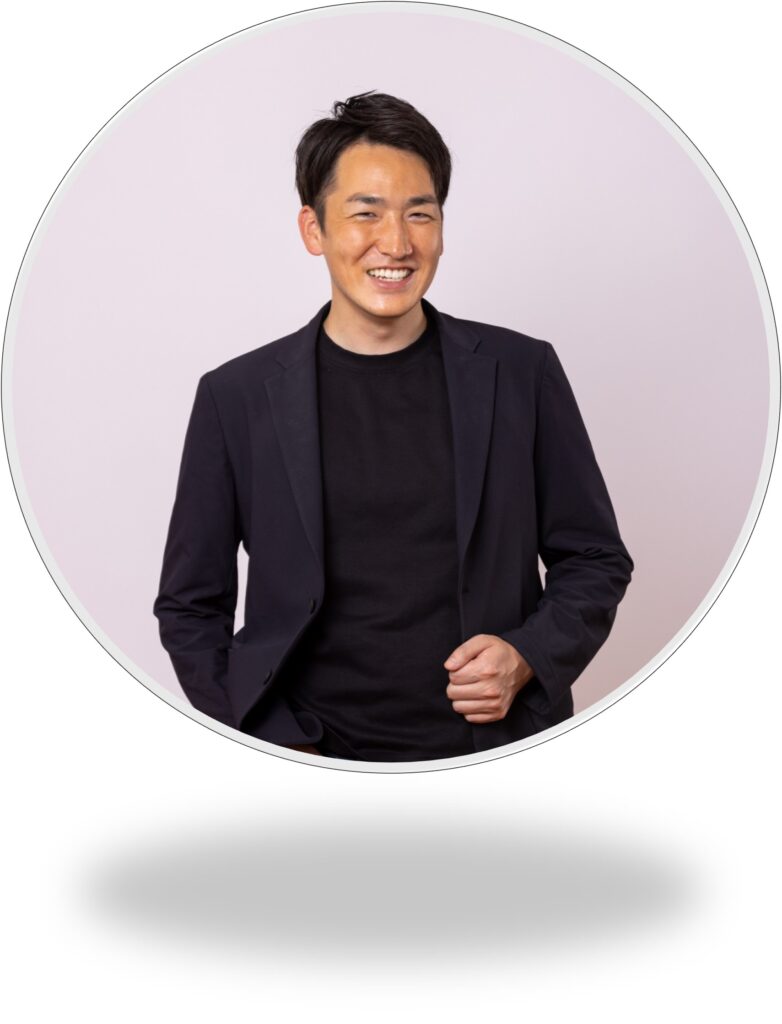
Z Venture Capital Principal Taku Uchimaru
Taku Joined Z Venture Capital in May 2022. Prior to Z Venture Capital, Taku engaged in supporting business growth, new business creation, and business revitalization for startups to enterprise companies at Industrial Growth Platform, Inc. (IGPI). Taku started his career at General Electric in Corporate Planning Division. Taku received his Master’s degree in Informatics from Kyoto University.
On the Commitment to Maximizing "I'm Glad I Came to Japan"
On the Commitment to Maximizing "I'm Glad I Came to Japan"
Naka: The service we're currently focusing on is "Linc Global Hub (Glo-Hub)."
It's a platform that provides comprehensive support from recruiting foreign talent to onboarding, followed by support for their success and retention, including visa renewals. We're building a system that uses AI to recommend the most suitable foreign talent to companies and realizes an all-in-one solution from matching to post-hire retention support.
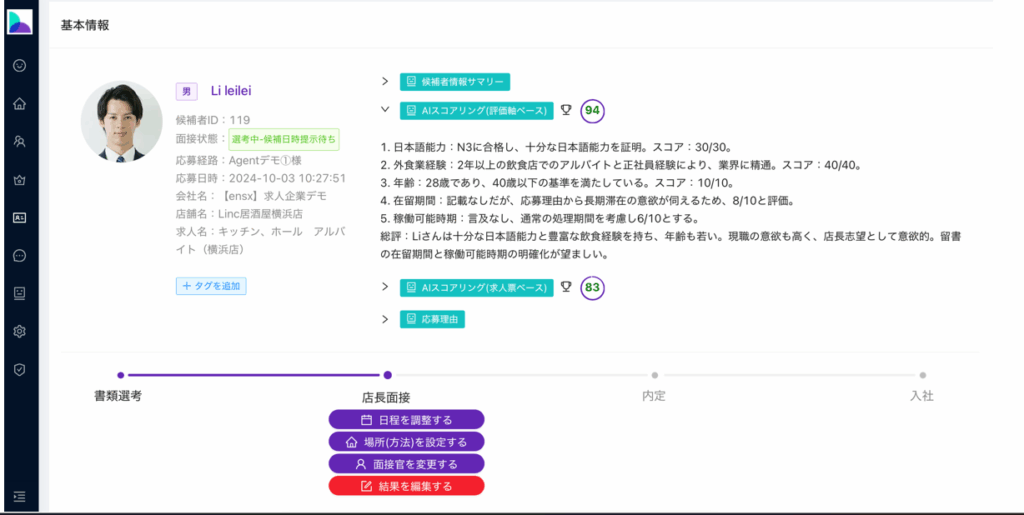
(For more information about Linc's Glo-Hub, click here)
Q: How is the implementation going?
Naka : Linc Global Hub has been implemented in approximately 4,300 locations. While implementation has accelerated mainly in the restaurant industry, adoption in the hotel industry has also been increasing recently.
For example, Highland Resort, part of the Fujikyu Group, has implemented it to address labor shortages in rural areas experiencing explosive inbound tourism popularity, and all foreign talent recruitment and process management is being realized on Glo-Hub.
In the future, we're looking to expand into the construction and logistics industries, and we have a major announcement planned soon. Our goal is to become the default platform for foreign talent recruitment across all industries.
Q: What's the background behind Linc's mission of "I'm glad I came to Japan"?
Naka: It stemmed from my own job-hunting experience—I felt it was such a waste that excellent foreign talent couldn't stay in Japan because they couldn't understand Japan's complex job-hunting rules.
When I was job hunting around 2013, it was during an employment ice age. On top of that, Japan's job-hunting rules are a bit complex for foreign talent.
For example, there are cases where at a certain interview session they say "This internship has nothing to do with the actual selection process," but in reality, the selection starts from there. Also, at a seminar for a certain bank, I was invited in a casual "let's have tea" kind of way, but when I got there, there was no tea, and suddenly they said, "So, please introduce yourself." Another time, I was told to "come casual," so I went in a T-shirt and jeans, only to find everyone else in black suits.
I really felt it was a waste that excellent talent couldn't stay because they didn't understand these unwritten rules. That's why I wanted to help as many excellent people as possible stay in Japan and truly feel "I'm glad I came to Japan"—that's the background.

(Naka with local elementary school students in Cuba in 2012)
Q: How have your feelings from that time evolved now?
Naka: After getting married and having children, a new perspective was added to my way of thinking. When my child turned two and started going to daycare, even though it wasn't a particularly foreign-heavy area, there were several children at the daycare with foreign roots, mixed-heritage children, and second-generation children.
Around 2040, when they become adults, statistics say Japan's population will decrease to about 80 million. In that context, I've come to think that if they can't thrive, Japan will be in a difficult situation. It's very important to create an environment where people can succeed regardless of their background or origin.
I want to create a society where people can think "I'm glad I came to Japan" for the next generation as well. Since having children, this mindset has become stronger, and my sense of mission about "what I can leave behind for them" has also intensified.
Why ZVC Decided on Follow-on Investment and Vision with LY
Q: Could you tell us about ZVC's decision to make an additional investment?
Uchimaru: Frankly, it comes down to one phrase: "there was no reason not to invest."
Breaking it down a bit further, there are several reasons.
First and foremost, it's the trust in Naka-san.
Naka and I have worked very closely together over the past year. I've been involved as an outside director, and we communicate frequently.
During this time, I've been able to gain a very deep understanding of how Naka approaches the business, how he wants to grow the company, and what kind of world he wants to create.
Naka: Thank you. This is an area where I myself have a strong sense of urgency. I'm constantly aware of the importance of growing the business in "wartime mode."
Uchimaru: The second reason is the business potential.
At the time of the initial investment, the beta version had just been released. A year has passed since then, and while there are areas where we've succeeded and areas where challenges remain, I feel tremendous potential.
Up until now, Linc's main focus has been on recruiting foreign talent. Regarding areas beyond recruitment, ideas that a year ago were just "maybe we could do this" now have concrete feasibility. Including KPI performance, I think Linc is in a really wonderful place right now.
And the third reason is the quality of the team.
Talented people have been joining one after another, achieving excellent results. While there's a limit to what Naka-san can do alone, a truly outstanding organization has been built, not just among management but including the frontline team as well.
To summarize, the three pillars of the investment decision are: first, Naka-san as an entrepreneur; second, the business potential; and third, team strength. Based on these three points, we determined that "there was no reason not to invest."
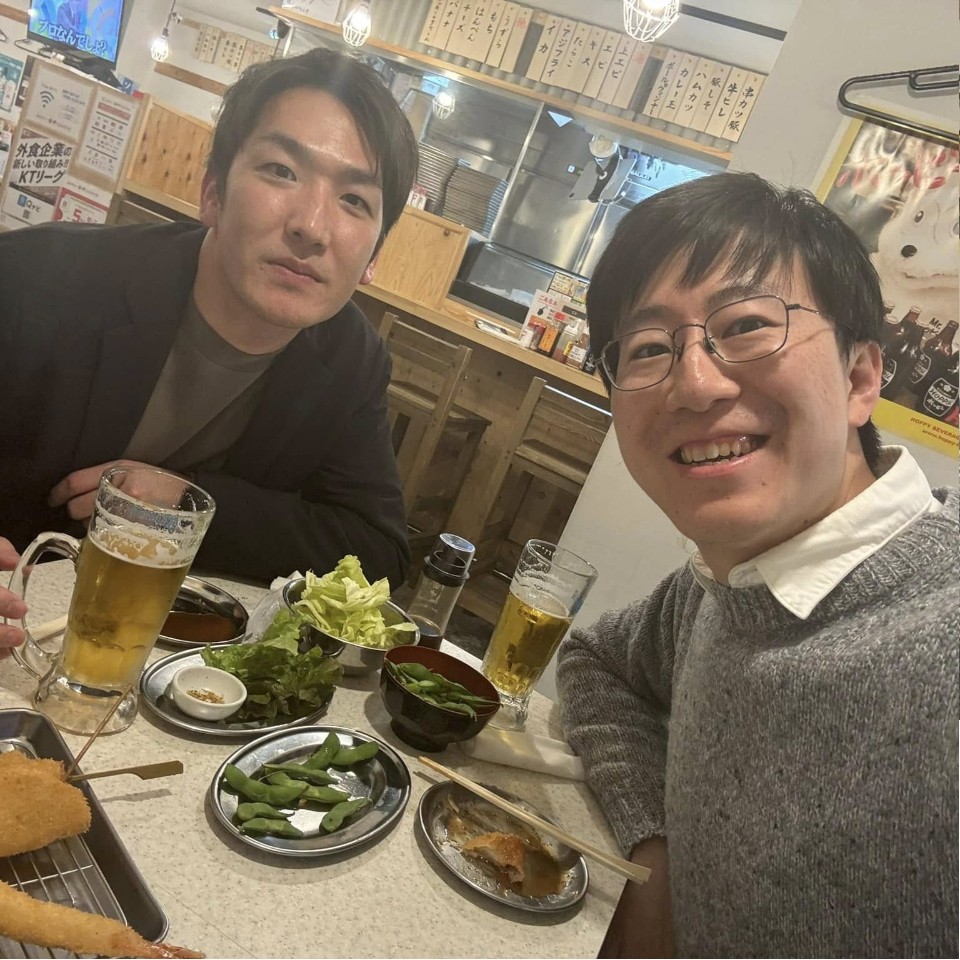
(At a kushikatsu restaurant that is also a Linc client)
Naka: At the time, we were still at the stage of "this hypothesis seems promising, but we won't know until we actually try it." Even so, receiving investment from ZVC was truly appreciated.
Uchimaru: Even back then, there was a hypothesis based on a clear direction, and I felt a sense that "this is going to work." A year has passed, and now that intuition has become closer to certainty. Of course, among the hypotheses, some hit the mark and some missed, but I feel the core parts have hit quite accurately, and the business has reached a point where it can truly succeed.
Q: I'd like to ask Naka-san as well—why did you decide to continue consulting with ZVC for follow-on investment?
Naka: While other VCs had expressed interest, ZVC was my top priority partner. What I vividly remember is the first time I met and spoke with Uchimaru-san.
The foreign talent space involves various policies, and information is frequently updated. Additionally, sometimes just the term "foreign talent" can create a negative impression.
As a result, in meetings with many people, the initial meeting would take considerable time explaining the market situation and the business. Sometimes, I would even take an approach like, "First, I've prepared an explanatory video, so let's talk after you watch that video."
In this context, I was amazed by the level of detail when I spoke with Uchimaru.
Whether it was the policy aspects of utilizing foreign talent, or understanding where the current major players are, what moves they're making, and what kind of moves he expected from us—I felt he was asking about these points carefully and with respect.
As a result, we were able to have a very deep discussion in just the first meeting, and I sincerely felt, "Wow, I've really met an incredible person." That was my initial impression.
Uchimaru: Thank you.
Naka: Since receiving the investment, over the past year, I've been sharing all our numbers with Uchimaru-san on a daily basis.
What I value most is not hiding bad situations. I make it a point to first communicate organizational and business challenges candidly. Then, through receiving feedback and discussing together, I strongly feel like we're verifying hypotheses together as co-founders.
And another key point is ZVC's abundant resources as LY's CVC. Uchimaru-san has introduced me to many people at LY Corporation, and we're currently developing a mini-app through LINE. Collaboration with a company like LINE Yahoo, which provides services in various aspects of daily life, is a very valuable relationship as an external partner.
Uchimaru: The collaboration with LY still has so much potential, so it's an important area where I want to work closely with Naka going forward.
Q: Speaking of LINE, could you tell us what you think would be interesting if collaboration with LY becomes possible in the future?
Naka: In particular, I think it would be interesting if we could create synergies through our user base and data holdings.
Users gather because they want to use Linc's product when job hunting. While users are job hunting, various life events occur daily. If we can add value in that regard, it would lead to user retention and word-of-mouth. Since LY has an extremely diverse service lineup, I think it would be fascinating if we could leverage that with the users and data that Linc will continue to grow.
If LY and Linc can collaborate, it will create significant impact for both parties. I'd like to explore such collaborations.
Vision for the Future: The Talent Linc Seeks and the Future Through Business
Q: Next, I'd like to ask about hiring. What kind of talent is Linc currently looking for?
Naka: What's most important right now is the business development side, what we call biz dev.
Business talent is essential for our service, and we think of this in three pillars.
・Deep diving into industries that actively hire foreign talent, such as the food service industry
・Strengthening post-hire user and client experience, such as training, development, and retention support
・Creating new businesses through alliances
Looking at these three pillars, we're short on talent in each area internally. We really want to build out this area. And since talented people are applying in large numbers right now, it's a golden opportunity—perfect timing.
Recently, we launched a full-stack engineering team in China. Our current AI head is from Alibaba. At Alibaba's Tmall, he designed search engine algorithms and was responsible for the algorithms and architecture that use reinforcement learning and machine learning to display appropriate results when users search. With these elements of business growth and talented people coming together, I believe our business will grow significantly.
Also, a CFO recently joined Linc. Going forward, I want to step back a bit from back-office operations and fundraising, and focus even more on product and business development.
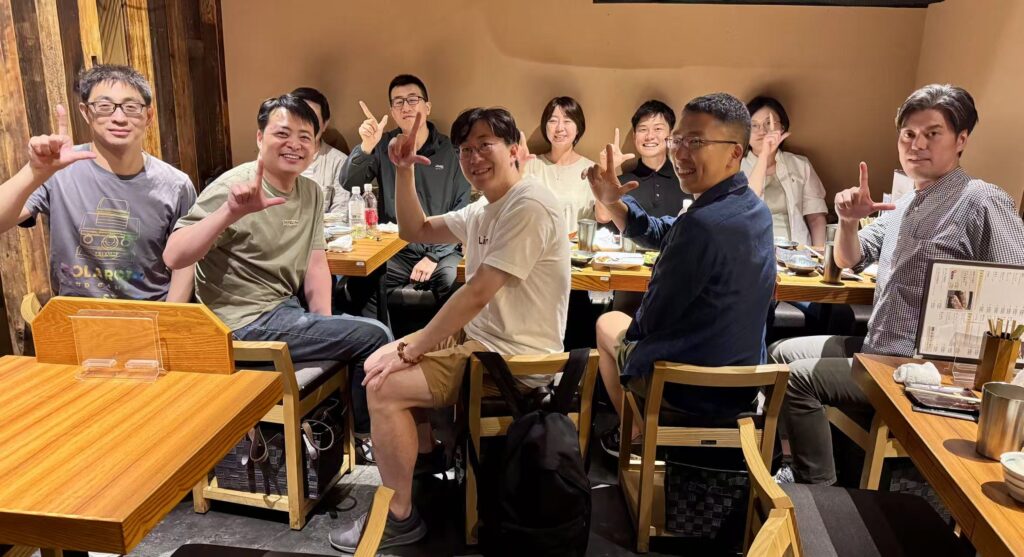
(Photo of Linc team members)
Q: Thank you. This is a broader question, but as the social structure shifts to include more foreign talent, there's also the perspective of what this means for Japan and local communities. Could you share your thoughts on how you want to shape communities through your business?
Naka: That aspect is also one of our key themes.
Labor shortages are often in the news, especially centered on regional areas. I think it's important for foreign workers to enter and integrate into these regional communities.
Just before this interview, I was speaking with a bank in the Hokuriku region. They mentioned that "after the Noto Peninsula earthquake, there's been a severe shortage of construction workers, site supervisors, and construction management personnel." By having foreign talent support such needs, they can interact with local residents through work and daily life, integrating more closely into the community.
The feeling of "I'm glad I came to Japan" is born from loyalty and attachment to the region, and I think this is naturally felt when people choose to settle in regional areas. This is the essence.
Q: I see. Another important theme is supporting the "daily lives" of these individuals, right?
Naka: Exactly. For example, city halls still have much room for DX. There are cases where unfamiliar paperwork takes hours, and people end up "just asking questions and going home." If Linc can advance DX through AI, streamline document applications and organization at city halls, and link with current global data, we believe procedures can be expedited. If AI can also handle questions, it will become even more convenient.
Our goal is not just to provide places to work, but to advance environmental development for settling in Japan. We want to keep the entire country and entire regions in view, and work on this collaboratively beyond the framework of a single company. To reiterate, what's important is not how to make people settle, but creating an environment and systems that make foreign workers want to stay.
Q: Finally, could you share a message for potential candidates interested in Linc?
Naka: I have three messages.
First, the challenge Linc is trying to solve is Japan's greatest challenge.
Population decline and economic downturn—we're tackling this challenge through the approach of foreign talent. We welcome those who want to take on big challenges and find solutions through trial and error together.
Second, solving this challenge is not just about economic success, but about creating infrastructure that will remain for the next generation.
To change Japan, we need not just short-term profits but sustainable mechanisms over the medium to long term. Therefore, I want people to join who resonate with making a significant impact on Japan's future.
Third, we have a truly interesting product and goal.
Currently, there are still many challenges and missing pieces, but the direction we're heading is definitely correct, and the challenge of revolutionizing the utilization of foreign talent using AI and data is extremely attractive.
Also, this kind of horizontal expansion—developing business by engaging broadly across completely different industries from food service to construction—is very rare. Let's realize the growth of the foreign talent business together. We look forward to your application. I highly recommend it!
[Linc recruitment information here]
https://linc-info.notion.site/Linc-ac6ed9f8b7884b34bd76efdb101174f7
 Share
Share Share
Share Share
Share
